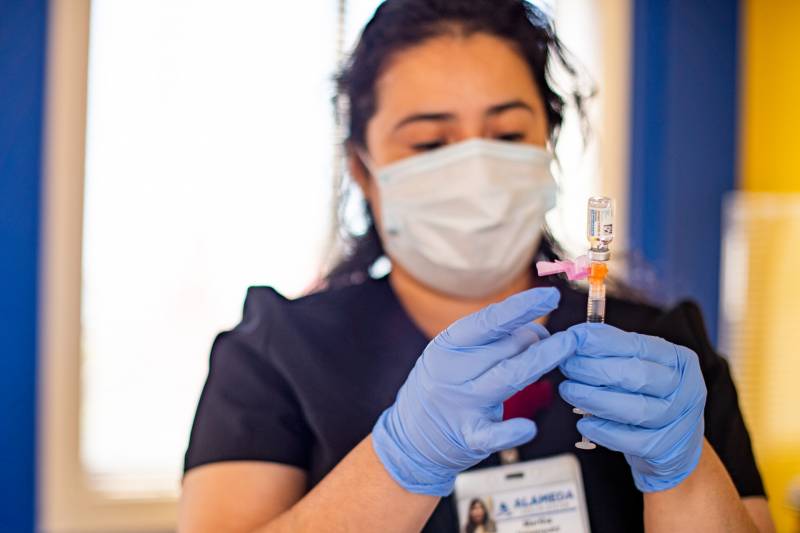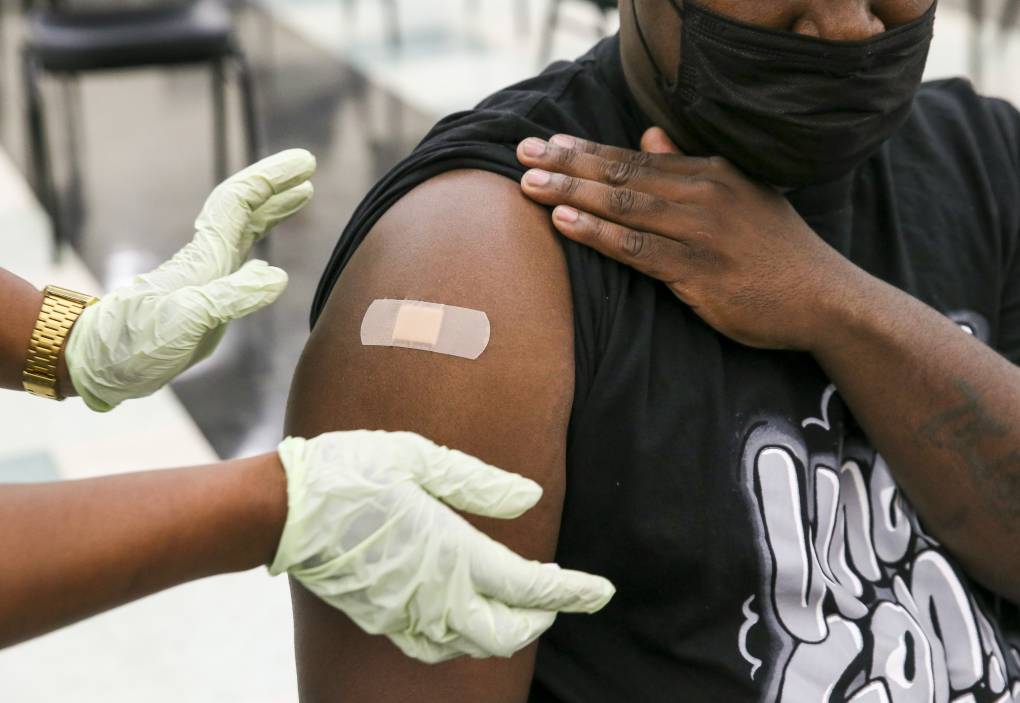U.S. health officials Wednesday announced plans to offer COVID-19 booster shots to all Americans to shore up their protection amid the surging delta variant and signs that the vaccines’ effectiveness is falling.
The plan, as outlined by the director of the Centers for Disease Control and Prevention and other top authorities, calls for an extra dose eight months after people get their second shot of the Pfizer or Moderna vaccine. The doses could begin the week of Sept. 20.
“Our plan is to protect the American people, to stay ahead of this virus,” CDC Director Dr. Rochelle Walensky said.
People who received the single-dose Johnson & Johnson vaccine will also probably need extra shots, health officials said. But they said they are waiting for more data. The overall plan is subject to a Food and Drug Administration evaluation of the safety and effectiveness of a third dose and a review by a CDC advisory panel.
Officials said it is “very clear” that the vaccines’ protection against infection wanes over time, and they noted that Israel has begun seeing a worsening of infections among vaccinated people. They said the U.S. needs to get out ahead of the problem before it takes a more lethal turn here and starts leading to hospitalizations and deaths among the vaccinated.
Dr. Anthony Fauci, the government’s foremost expert on COVID-19, said that one of the key lessons of the virus is that it’s better to “stay ahead of it than chasing after it.”
Dr. Mark Mulligan of NYU Langone Health welcomed the announcement as a “proactive” response to signs that vaccine strength is eroding as the highly contagious delta variant spreads.
“Part of leadership is being able to see around the corner and make hard decisions without having all the data. It seems to me that’s what they’re doing here,” he said.
Why is the U.S. recommending booster shots while other countries wait for vaccines?
Top scientists at the World Health Organization bitterly objected to the U.S. plan, noting that poor countries are not getting enough vaccine for their initial rounds of shots.
“We’re planning to hand out extra life jackets to people who already have life jackets, while we’re leaving other people to drown without a single life jacket,” said Dr. Michael Ryan, the WHO’s emergencies chief.
The organization’s top scientist, Dr. Soumya Swaminathan, said: “We believe clearly that the data does not indicate that boosters are needed” for everyone. She warned that leaving billions of people in the developing world unvaccinated could foster the emergence of new variants and result in “even more dire situations.”
U.S. Surgeon General Vivek Murthy rejected the notion that the U.S. must choose between “America and the world.”
“We clearly see our responsibility to both, and we’ve got to do everything we can to protect people here at home while recognizing that tamping down the epidemic across the world is going to be key,” Murthy said.
White House officials noted that the U.S. has donated 115 million doses to 80 countries, more than all other nations combined. They said the U.S. has enough vaccine to dispense boosters to the American people.
What does this mean in California and the Bay Area?
As yet, logistics are unclear — but this announcement of booster shots is a move many in the health community here have been anticipating for a while.
Dr. Tomás J. Aragón, California Department of Public Health director and state public health officer, said that CDPH “has been planning for and is ready to begin administering booster doses in California starting in late September, pending review and approval by our federal partners and the Western States Scientific Safety Review Workgroup.”
“I think that this has been something we’ve been waiting for for some time,” Dr. Bela T. Matyas, health officer and deputy director of Solano County Public Health said. “From the very beginning of the vaccination campaign, we were aware the boosters are going to be needed at some point. So at least now we’re getting better clarity on the timing.”
Matyas also said that the general thinking in the public health community is that the COVID vaccination “will probably become an annual vaccination,” much like the flu shot.
As well as still administering first and second doses of the vaccine to residents, Bay Area counties are beginning to roll out third doses of the Pfizer and Moderna vaccines to immunocompromised people who qualify for a booster shot under the CDC’s guidelines. Right now, these booster shots are limited to a relatively small group of people with specific conditions. Read more about getting a third dose of the vaccine today if you’re immunocompromised.
The Bay Area might expect to see at least the partial return of the kind of mass COVID vaccination sites that were established earlier this year to handle the demand for first and second doses of the vaccine for the general population age 12 and over. The majority of these mass vaccination sites — such as the Oakland Coliseum and San Francisco’s Moscone Center — were shuttered as demand waned, but a San Mateo County spokesperson said the county expects to “remobilize some mass vaccination capacity to offer timely, large-scale delivery to supplement what our health care partners expect to deliver.”
As for the timing of any booster shot program, even if these vaccinations start Sept. 20, the rollout for a booster dose could be staggered according to eligibility, rather than being opened up to everyone at the same time. San Francisco Department of Public Health officials said they’re anticipating “a phased rollout similar to how the vaccine was initially distributed: prioritizing the most vulnerable, in collaboration with our health care and pharmacy partners.”
San Mateo health officials also said they’re “closely monitoring the federal deliberation that will lead to broader use of boosters for other populations, likely commencing with health care workers, residents of high-risk congregate care facilities and older adults.” Dr. Matyas of Solano County Public Health echoes this as an ideal structure for those initial vaccination tiers, after which “then I believe we have the resources to be able to get out there and boost everybody.”
How has the thinking on booster shots evolved?
Israel is already offering booster shots to people over 50 to control its delta surge. And European medical regulators said they are talking with vaccine developers about the idea.
Last week, U.S. health officials recommended boosters for some people with weakened immune systems, such as cancer patients and organ transplant recipients. Offering boosters to all Americans would be a major expansion of what is already the biggest vaccination campaign in U.S. history.


